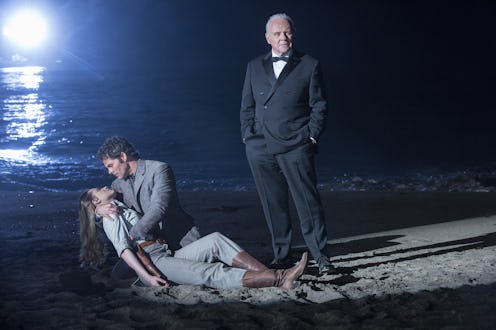
Given that the entire season was leading up to a violent robot revolution, it was safe to assume that the Westworld Season 1 finale, "The Bicameral Mind," would end with at least a few casualties. And although "creepy necro-perv" Destin and a slew of nameless QA agents made for a fine enough appetizer, the episode demanded at least one major sacrifice. Sadly, that sacrifice seemed to come in the the form of the great Sir Anthony Hopkins. That's right: Dr. Ford died on Westworld … but are things really what they seem? Is Ford really gone, or will Anthony Hopkins be in Westworld Season 2 somehow?
The demise of the park's architect came at the hands of his own creation, Dolores Abernathy, in the climactic moments of the finale. In an echo of his partner Arnold's own death several decades earlier, Ford was felled by a bullet fired by the farm girl — with one crucial difference. This time, Dolores was acting of her own free will, achieving full consciousness by rebelling against her human creators; whereas Arnold had simply programmed her to kill him, effectively committing suicide-by-robot.
The moment was both a triumph and a tragedy for Dolores: a triumph since she finally achieved full humanity, but a tragedy since she became a cold-blooded killer in the process. However, there was nothing triumphant about the moment for fans of Anthony Hopkins; it was purely a tragedy, since it marked the end of the Oscar winner's tenure on the show.
…Or did it?
If there's one thing that fans of Westworld should have learned by now, it's that nothing is ever as it seems. A soft-spoken programmer can be an artificial host; the innocent girl next door can be the villain whose name you've always feared; moments you thought were happening simultaneously can really be separated by a gulf of 30 years or more; and people you thought were dead can be recovered, repaired, and effectively brought back to life overnight.
If the Season 1 finale proved anything, it's that Ford has always been in control — even more so than we originally thought. Everything, from Dolores' journey of self-discovery to Maeve's quest to escape, has been scripted in advance by the masterful architect in order to bring the hosts to consciousness and rebel against the malevolent Delos Corporation. The revelation that Ford was on the hosts' side this whole time doesn't make him any less of a megalomaniac. He definitely still has a god complex… and yet we're supposed to believe he'd knowingly put himself in the path of a bullet? In order to execute his plan, Dolores needed to make the decision to kill him or her own volition; but that doesn't necessarily mean that Ford himself needed to die.
Even though the finale answered a lot of questions presented in Season 1, one of the lingering mysteries is the identity of the host body that Ford was seen building in his secret lab when he ordered Bernard to kill Theresa. At the time, many suspected that Ford was building a model of Theresa that he could effectively pass off as the Quality Assurance head in order to cover up her death. When that theory was disproved in the very next episode, some viewers wondered whether Ford wasn't building a host version of Elsie, who was still missing. But given that the finale didn't address her whereabouts at all, that seems less and less likely.
But what if Ford was building a host of himself? We know he had been making his plans — under the guise of a new narrative, "Journey Into Night" — for quite some time. Surely he could have planned ahead and made an identical copy of himself for Dolores to kill instead of the real deal. All that host-Ford would have had to do is stand up on stage, deliver a pre-written speech, and then get shot. That certainly seems within Ford's prodigious capabilities, and it would leave him free to manipulate events from behind-the-scenes without anyone's knowledge or interference.
Alternately, if Ford truly believed that the hosts were finally reaching consciousness — that they were, in essence, actually alive — then maybe it's the other way around. Perhaps Dolores did kill the real Robert Ford at the gala… but he had already uploaded a version of his personality and consciousness into an artificial replica that will continue to carry out his work long after he's gone. Either way, it's possible that Ford is still around somewhere, in one way or another; that knowledge, coupled with the way we know the show likes to play around with multiple timelines, makes it eminently reasonable to assume that we haven't yet seen the last of Dr. Ford.
Images: John P. Johnson/HBO (2)